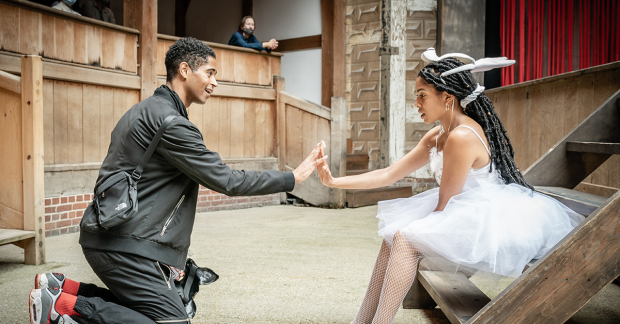
© Marc Brenner
How does the Taylor Swift lyric go? "Romeo, take me somewhere we can be alone?" As Alfred Enoch and Rebekah Murrell's cursed couple rush out of the Globe auditorium after first locking eyes during the ball scene and a few choice words, you do get the feeling as though you're missing a moment of pure romance: love blossoming away from prying eyes. It's sad to be deprived of time with a couple that are so deeply amiable when on stage.
The venue returns with another bombastic take on Shakespeare's greatest tragedy, after the over-amped, haze-filled drum 'n' bass-y production that kicked off Emma Rice's final season a few years back.
The main innovation in Ola Ince's new staging, running straight through at around 110 minutes, is the presence of a large screen – projecting relevant facts and information about mental health in young adults, or the impacts of a disrupted domestic environment on wellbeing. The facts are startling: adults don't reach a fully formed emotional understanding until around the age of 25. Facilitated and frantic, Ince's point is relatively opaque from the get-go: Romeo and Juliet are freewheeling to destruction.
There's a rub: didacticism is prioritised over complex, character-driven dynamics: it's a harrowing learn, but less a harrowing watch. Murrell and Enoch's wonderful work is restricted by the parameters of the production, almost as if we, the audience, are obliged to witness their demise through a very specific lens. The pair still manage to tease out fine nuances in their characters: Enoch's is a near-benign, academic, ebullient Romeo pitted against Murrell's kick-boxing, stubborn Juliet, the pair sparking a maelstrom of violence ignited thanks to the fractured world they exist in.
Any attempt to transform and augment the Globe's stage is always worth a watch, and with BMX bikes, belting music ripped straight from an Arctic Monkeys album and some crack turns from Adam Gillen as Mercutio and Sirine Saba's put-upon Nurse (the latter in particular leaning heavily into the well of sadness drawn from the death of her daughter Susan), there's a lot to enjoy. The design team pepper flecks of red over a monochromatic get-up – blood washing across the production. Enoch and Murrell's balcony scene – him, clambering up ladders in the yard while she, tipsy, lounges against a balustrade, is about as good as they come.
Ince adds touches of visceral, unpleasant gore – Mercutio whines as he dies, his youthfulness is displayed in startling horror. This a tragedy of society, rather than one of a stricken pair of lovers.













